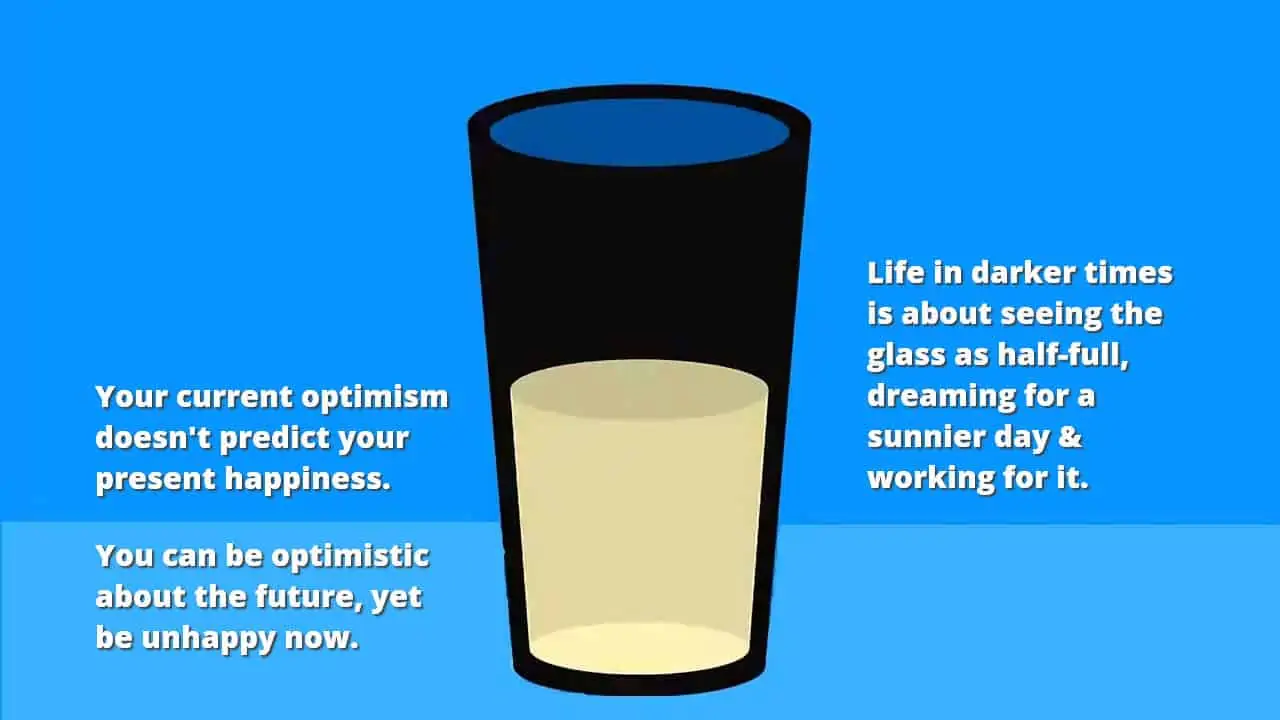Mindset matters. This question, when you see a glass filled with liquid to its halfway mark, is your starting point:
“What do you see — a half-empty or a half-full glass?”
The glass-half-full type of people are the cheery optimists who interpret any situation with a positive mindset. These people have more energy and they bounce back stronger from adversities.
Being an optimist is a reliable way to increase your life satisfaction as well as your life span. A 2019 study found optimistic people lived up to 15% longer than pessimists.
[• You’d love to check this out: How To Stimulate Your Vagus Nerve And Calm Down]
3 Worst Things About A Glass-Half-Full Type of Person
You inherit some of your optimism from your parents. So, if you discover you have any of the following three terrible flaws because of your glass-half-full outlook, they are partly to blame.
Optimism is the psychological trait of expecting things to go well in the future. Optimists believe their future will be favorable because they control its major outcomes. It’s mostly a good quality to have.
But there are certain things wrong with the glass-half-full type of people.
An overly half-full glass type of person could be a procrastinator, a perfectionist, and even suffer delusions of success.
1. Procrastination
They might be a procrastinator because they think the glass is already half-full, so they can delay filling it up now.
Procrastination is the deliberate postponing of actions or decisions. Procrastinators are overly optimistic about their ability to finish their tasks on time.
This is evident in people who are always late; they are overly optimistic about having too much time on their hands. It makes them see the time allotted unrealistically; a phenomenon called planning fallacy.
A glass-half-full person may decide to put off a task because they believe they would be better able to do it the next day. When people repeatedly postpone the same task several times, they develop a habitual overestimation of their future time limits.
2. Perfectionism
Excessively optimistic persons may be perfectionists. They are the people who think an exactly horizontal, half-full level, shows the perfect balance between emptiness and fullness.
Big optimism, what the scientists call dispositional optimism, appears related to perfectionism. Big optimists believe that if lofty goals are achievable, then they are the ones to achieve them. It is a part of their success-seeking nature.
Success needs a pursuit of excellence, but this sprint of pursuit can become a perfectionist’s marathon.
People with strong perfectionism can go into depression at the perception, or anticipation, of failures (Frost et al., 1990).
3. Delusions of Success
The vast majority of business initiatives fail. The reason, as Dan Lovallo and Nobel laureate Daniel Kahneman found, is that managers make overly optimistic projections.
Under organizational pressures and cognitive biases, they approve investments into risky initiatives by exaggerating the likely benefits while ignoring the possible pitfalls. You may look at it as glass-half-full managers having delusions of success.
This type of forecasting is what psychologists call the planning fallacy, the same mistake that directs procrastinators. It makes the executives make decisions based on delusional optimism rather than a rational analysis of the risks.
Furthermore, the optimists may be deserters, leaving projects midway, expecting others to fill in for them. Since they have already done half the job, and have a half-full glass, they lose interest and go away to do something else.
By the way, what’s your personal definition of success?

As you can see, your current level of optimism may not be comparable to your present level of happiness. You may be optimistic that tomorrow will be a beautiful day, yet you could be depressed today. Conversely, you may be aware that next week will bring some unpleasant news, yet you may be having a great time right now.
What is the best thing that those who see the glass as half-full can do? Wish hard, then work even harder.
Overoptimism
Another problem with the glass-half-full people is that they tend to put a positive and optimistic spin on any given situation. This makes them prone to exhibit Overoptimism: When Optimism Stops Being A Happiness Magnet.
Overoptimism, or a pervasive optimistic bias, can distort reality and make a person feel special, gifted, and entitled. An example was Steve Jobs, whose success at Apple made him believe (until it was too late) that he could cure his cancer through herbal and acupuncture treatments.
Everyone who sees a glass as half-full is not overly optimistic, but the risk runs higher.
In his 2011 book Thinking, Fast and Slow, psychologist Daniel Kahneman said that “people tend to be overly optimistic about their relative standing on any activity in which they do moderately well.”
What’s Right With Being A Glass-Half-Full Person?
Having pointed out the negative aspects, let’s go over what’s right with being a glass-half-full person.
▪ People who see the glass as half-full focus on how much resource is still available in a given situation. The first thing they do is to remind themselves that it is not completely empty. For them, even a small amount of water in the glass is a point of advantage. They are thankful that they have that much water to quench their thirst.
▪ The glass-half-full people are satisfied with their place in life. They feel contented with what they have. They see their life as full of gifts and feel grateful to those who gave them those. Their joys are more because they count and savor their blessings.
▪ People who see the glass half-full not only think more positively, but they also have more decisiveness, patience, playfulness, competitiveness, and creativity, as a study on 2,000 Americans found.
▪ In the study, when shown an image of a glass with an equal amount of milk and empty space, 58% of the participants felt it was half-full, 16% said it was half-empty, and the remaining were indecisive.
▪ Research has found seeing the glass as half-full not only makes you happier, healthier, and wealthier. Psychologist Susan Segerstrom found that optimistic law students, ten years after graduation, earned an average of $32,667 more than their glass-half-empty peers.
▪ Lee et al. (2019) found optimism can extend the life span, especially in older adults. Their results suggest optimism is specifically related to an 11 to 15% longer life span, on average. Researchers concluded that higher levels of optimism serve as a psychological resource that promotes health, a longer life span, and a greater chance of achieving “exceptional longevity,” that is, living to the age of 85 or beyond.
▪ A study by Laura Kubzansky et al. (2001) found an optimistic explanatory style may protect against the risk of coronary heart disease in older men. The study was aptly named, “Is the glass half empty or half full?”

▪ The glass-half-empty thinkers, in the same study, tended to be more laid-back, introverted, serious, and proud as compared to the glass-half-full thinkers. Surprisingly, glass-half-empty thinkers did not always identify as pessimists. In fact, 48% of glass-half-empty people believed they are more optimistic than pessimistic.
▪ The better aspect of these people is their ability to go out and work towards their goals. Psychologists define optimism as a psychological trait characterized as the general expectation that good things will happen, or the belief that the future will be favorable and under their control.
▪ While they feel a sense of gratitude, they also feel immensely motivated to work towards filling up that glass to the full.
▪ Exploring further, these people are also helpful towards others. They feel compassionate towards other people’s misery and help them fill their glasses.
The glass-half-full people look for the silver lines in dark clouds.
Since the advantages of having an optimistic attitude exceed the disadvantages, you should endeavor to cultivate one. Even if you’re not naturally a glass-half-full person, you may learn to be one by practicing gratitude (read more).
How To Answer “Are You A Glass-Half-Full Person?”
Here’s the fun part! Let’s explore the question “Are You A Glass-Half-Full Person?” from 3 different perspectives.
• A physics guy’s take on it:
A glass on earth never remains empty; it’s always full. When it’s filled up to half with water, the other half contains air.
• Here’s how a minimalist sees it:
If the glass is half-full and serves your needs, then you may not need to fill it to the full? Why greed for more?
If the glass is half-empty, you may leave the empty part for others to fill. Why occupy space more than you require?
By the way, “minimalism” is a lifestyle of owning and keeping only those things that add value and meaning to your life, while discarding the rest.
• This is how a philosopher may argue:
The question posed is itself a false dilemma, and the answer is within, rooted in realism.
“Realism” is talking of unchangeable facts; e.g., the moon takes 28 days to go around the earth. “False dilemma” is when you wrongly box any issue within two-limit options, e.g., “If you are not with me, then you are against me” without considering the person might be a fence-sitter.
Final Words
If you were to ask me, I’d love to say this:
“To begin with, you have a glass! So, celebrate! Now go fill it up with whatever you want, to whatever level you want.”
That asserts two things. First, the happiness of having something to work with. Second, the motivation to go out and build it up from there.
FAQ
Do parents pass down their optimism?
A glass-half-full attitude can be passed down from ones’ parents. An optimistic temperament is around 25% heritable, but it can also be learned and shaped by social mechanisms, such as attachments to friends and family (Meevissen, 2011).
• • •
Author Bio: Written and reviewed by Sandip Roy—a medical doctor, psychology writer, happiness researcher. Founder and chief editor of The Happiness Blog. Writes popular science articles on happiness, positive psychology, and related topics.
• Our story: Happiness Project
√ If you enjoyed this, please share it on Facebook or Twitter or LinkedIn.